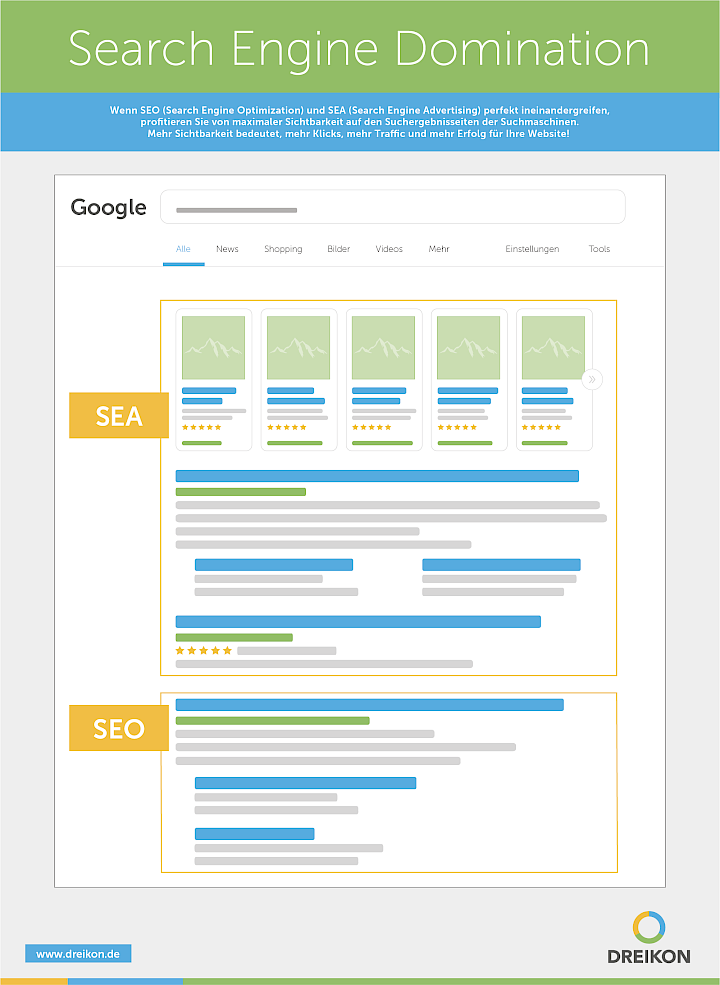Search Engine Marketing
Search Engine Marketing (SEM) is a digital marketing strategy that aims to increase the visibility of a website in the search engine results pages (SERPs). SEM includes both search engine optimization (SEO) and search engine advertising (SEA). SEO involves optimizing websites in order to improve organic rankings. With SEA, advertisers pay for the placement of ads in the search results.
The basic idea behind SEM is to boost the online presence of a company or brand by positioning their website at the top of search engine results.Search Engine Marketing - SEO & SEA
Search Engine Optimization (SEO)
SEO aims to improve the visibility and ranking of a website in the organic (non-paid) search results of search engines. It involves optimizing various aspects of a website - such as content, structure and metadata - based on keywords that are relevant to the target audience. The aim is to drive more quality traffic to the website by making the site appear higher in the search results for relevant search queries. SEO includes on-page optimization (such as keyword integration and content creation) and off-page optimization (such as link building) to increase the authority and relevance of the website.
- Time-consuming: Implementing measures to improve organic search rankings requires considerable effort in terms of technology, content and strategy, which takes a long time. Lengthy: Changes in ranking and perception by search engines such as Google can be delayed. It can often take six months for the effects of optimization measures to become apparent.Sustainable: Carefully developed landing pages can maintain their relevance and ranking for years without the need for continuous adjustments, as organic rankings change only slowly.
Search Engine Advertising (SEA)
SEA (Search Engine Advertising) refers to the placement of paid ads in the search results of search engines such as Google. Companies pay to place ads in order to appear at the top of the search results page for certain search terms (keywords). This is usually done via a pay-per-click model (PPC), where advertisers only pay when their ad is clicked on. SEA enables quick visibility and a targeted approach to potential customers, in contrast to the long-term strategy of search engine optimization (SEO).

The role of SEM in digital marketing
In the digital age, most people use search engines such as Google, Yahoo or Bing to search for products, services or information. In German-speaking countries, Google dominates the market with a share of around 95 percent. Search engine marketing, including the sub-areas of SEO and SEA, has established itself as one of the most effective strategies for using online marketing budgets efficiently and generating traffic to websites. According to a forecast by Statista, a significant proportion of marketing budgets in Germany are spent on search engine marketing, with a large proportion being invested specifically in search engine advertising.
Goals of search engine marketing
The goals of Search Engine Marketing (SEM) are diverse and aim to maximize the online presence and visibility of a brand or website in search engines. The main objectives include:
1. increasing website traffic: driving more qualified traffic to the website through improved visibility in search results and targeted advertising campaigns.
2. increasing brand awareness: placing the brand prominently for relevant search queries to increase awareness among the target group.
3. generation of leads and sales: Drive lead generation and product or service sales through targeted ads and website optimization for high-converting keywords.
4. competitive advantage: Achieve a better position compared to competitors and secure or expand market share through effective search engine marketing.
5. optimization of marketing costs: achieve a better ROI (return on investment) for the marketing budget through the use of targeted, measurable SEM strategies.
6. adaptability and flexibility: quickly adjust and optimize campaigns based on performance data and market changes.
Search Engine Marketing enables companies to achieve their online marketing goals effectively and efficiently through a combination of paid advertising (SEA) and optimization for organic search (SEO).
Benefits of search engine marketing for companies
Search Engine Marketing (SEM) offers numerous advantages for companies of all sizes. It enables a targeted approach to potential customers who are actively searching for products or services. This increases the efficiency of advertising measures and minimizes wastage. By optimizing for specific keywords, companies can improve their visibility in search engine results, which leads to an increase in organic traffic. SEM not only supports the acquisition of new customers, but also helps with brand building and positioning in the digital space. The ability to adjust campaigns in real time and measure their performance also gives companies the flexibility to quickly optimize their marketing strategies and effectively maximize ROI.
Search Engine Marketing - a conclusion
Search engine marketing is a comprehensive strategy in the digital world that aims to improve the visibility and ranking of a website in search engine results. It combines optimization for organic search (SEO) with paid advertising (SEA) to promote an efficient and effective online presence.
As it enables businesses to maximize their online presence, increase brand awareness, generate leads and sales, secure competitive advantage and achieve better ROI for their marketing budget, Search Engine Marketing plays a crucial role. Overall, SEM is a versatile and effective method to efficiently achieve marketing-related goals in the digital landscape.








